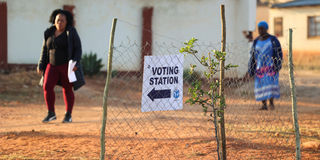South Africans vote in most competitive election since end of apartheid

A view of a sign displaying the direction in which the voting station is located as people walk to cast their votes in the South African elections in Mahlanhle Primary School in Ga Mahlanhle, Limpopo Province, South Africa, May 29, 2024.
SOWETO, South Africa, May 29 - South Africans began voting on Wednesday in the most competitive election since the end of apartheid, with opinion polls suggesting the African National Congress (ANC) will lose its parliamentary majority after 30 years in government.
Polling stations opened around 7am (0500 GMT), with voters queuing at some locations including Hitekani Primary School in the vast township of Soweto near Johannesburg, where President Cyril Ramaphosa was expected to vote later.
Security guard Shivambu Yuza Patric, 48, came straight to the polling station after working a night shift. He said he had not voted in the previous election because he had lost faith in the ANC, but he was hopeful this election would bring change.
"They do nothing for the people," he said of the ANC. He said he would decide at the last minute who to vote for but was leaning towards small opposition party ActionSA.
Then led by Nelson Mandela, the ANC swept to power in South Africa's first multi-racial election in 1994 and has won a majority in national elections held every five years since then, though its share of the vote has gradually declined.
If it falls short of 50 per cent this time, the ANC will have to make a deal with one or more smaller parties to govern - uncharted and potentially choppy waters for a young democracy that has so far been utterly dominated by a single party.
"There's a lot of uncertainty with what's going to happen. Are we going to have a coalition?" asked student and first-time-voter Amena Luke, 19, as she waited to cast her ballot at Berario Recreation Centre in Johannesburg.
The ANC is still on course to win the largest share of the vote, meaning that its leader Ramaphosa is likely to remain president, unless he faces an internal challenge if the party's performance is worse than expected.
Voter dissatisfaction over high rates of unemployment and crime, frequent power blackouts and corruption in party ranks lies behind the ANC's gradual fall from grace.
'FRESH MINDS'
Outside the polling station at Midrand High School, in a northern suburb of Johannesburg, voters waited in a long line that stretched down the street and around the corner. They wore beanies and coats and some were wrapped in blankets to fend off the morning cold.
"I voted for the EFF and that's because I need fresh minds in parliament," said Andrew Mathabatha, 40, a self-employed engineer, who arrived early to vote there.
He was referring to the Economic Freedom Fighters, a party founded by Julius Malema, a firebrand former leader of the ANC's youth wing. It wants to nationalise mines and banks and seize land from white farmers to address racial and economic disparities.
More than 27 million South Africans are registered to vote at more than 23,000 polling stations located in schools, sports centres and even a funeral parlour in Pretoria. Voting will continue until 9pm (1900 GMT).
Turnout in South African elections has gradually dropped over the years as disenchantment with the ANC set in, and one of the key variables in this election will be whether the possibility of change draws more voters to the polling stations.
At Sandton Fire Station in an affluent business district in northern Johannesburg, independent election observer Maubate Kekana of the Ground Work Collective campaign group was encouraged by the numbers who had turned out to vote there.
"I arrived early before the station opened and it was really quite a big queue outside. So really hoping that there's a big turnout during the course of the day," she said.
Voters will elect provincial assemblies in each of the country's nine provinces, and a new national parliament which will then choose the next president.
Among opposition parties vying for power is the pro-business Democratic Alliance, which won the second-largest vote share in 2019 and has formed an alliance with several smaller parties to try to broaden its appeal.
Former president Jacob Zuma is backing a new party called uMkhonto we Sizwe (MK), named after the ANC's former armed wing. Zuma, who was forced to quit as president in 2018 after a string of scandals, has enduring influence, particularly in his home province of KwaZulu-Natal.
The election commission is expected to start releasing partial results within hours of polling stations closing. The commission has seven days to announce final results but at the last election - also held on a Wednesday - it did so on a Saturday.





